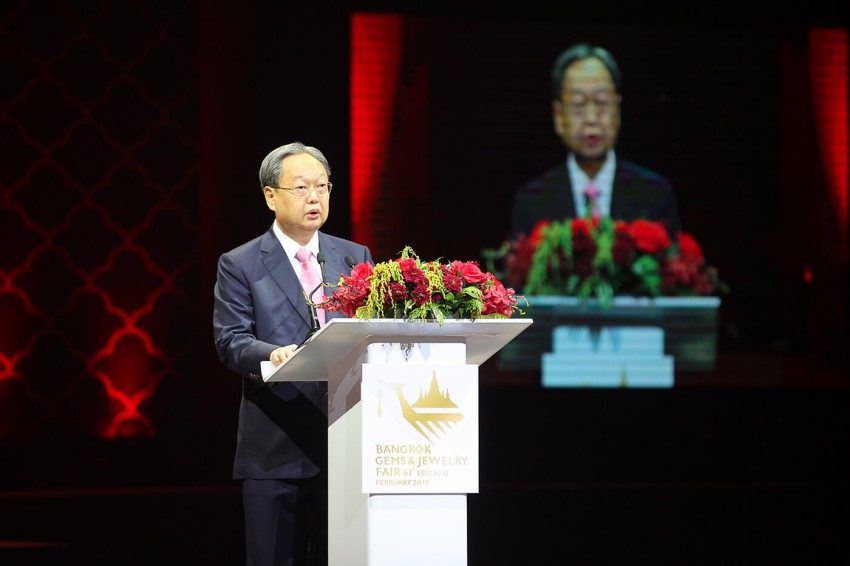The Worldfolio sits down with Thailand’s Minister of Commerce Sontirat Sontijirawong to discuss trade and investment relations with its most important business partner, Japan.

Thailand and Japan share a long-standing relationship. 2017 marks 130 years of relations between Thailand and Japan and 10 years since the signing of the Japan Thailand Economic Partnership Agreement. After China. Japan is the second most important trading partner. From a commercial view, how do you evaluate the trade relationship between Thailand and Japan?
Japan is a great partner to Thailand and stands as the number one source of foreign direct investment to our country. Japan and Thailand have a long standing relationship between them, and in terms of trade, Thailand and Japan have different products that complement each other very well. Products from Thailand like agricultural products, that have long been the mainstay of the Thai economy, fit the needs of the Japanese people. So we export lots of agricultural products to Japan. We also import many types of products and services from Japan.
At the same time, as you know, many Japanese companies have invested large amounts of money in Thailand, such as those in the automobile industry. Most of the automobile companies that distribute cars in Thailand are Japanese companies, and they use Thailand as one of the hubs to export to the other countries in the region.
In terms of investment, Japanese companies also invest in Thailand and also use Thailand as a hub to export back to Japan and the region. Thailand, due to it’s strategic location is suitable for Japanese policy, in their quest to try to relocate industries to the other areas of the world.
Thailand’s strongest advantage is that we are at the center of Asia. Only in the ASEAN region there is a population of 630 million, and luckily we are at the center of the region, bordering countries like Cambodia, Myanmar, Laos, Malaysia and close to China and Vietnam. We cross to Cambodia, Myanmar, Vietnam, Laos and the southern part of Malaysia. So it means that out of the 10 member countries of ASEAN, Thailand already has access to five. There is no doubt that we can claim that Thailand is at the center of the region, so it’s a geographically strategic for Japan to relocate and expand their investment here. If they have their manufacturing base in Thailand and set up shop for example in the EEC area, not only do they have access to our domestic market, but to all of the ASEAN.
The government of Thailand is, through Thailand 4.0, putting a lot of effort into transforming Thailand into a value-based economy driven by innovation, technology and creativity. Taking into account that Japan is one of the most technological advanced economies in the world. What do you think is the added value of Japanese investment and how can Thailand export industry benefit from it?
Japanese investment is an investment of quality. Japan not only invests to produce here but they also transfer knowledge and technology. Japanese companies are very keen in terms of technology transfer, providing skills and being ahead in terms of innovation and quality. So Japan, not only invests in resources but in development, which allows industries to grow. One thing that the Japanese admire is that they can find a quality workforce in Thailand. We are not labor intensive any more, our people are educated people, and we have been trained to provide a quality workforce for the long term. Our workforce is prepared to work with high technological advancements. So we cannot be compared to our neighboring countries, as we are moving to an added value driven economy, so we compliment perfectly Japan’s strategies of using Thailand as a hub, we can exchange and transform technology.
One thing that is very important, when Japanese companies move to Thailand, they need the value chain of raw materials or semi-finished products and Thailand has for a long time been developing these industries and can service the big Japanese companies coming to Thailand and support the value supply chain.
Thailand is an export-oriented economy. How does the Minister of Commerce or Institutions under the Ministry like the Department of International Trade Promotion serve as a one-stop shop for investors and foreign companies?
The Department of International Trade Promotion can support and provide information to any Japanese company willing to trade or set up shop in Thailand. DITP can help Japanese companies with advisory services and provide match-making links between foreign and local companies.
From the Ministry of Commerce, we also try to facilitate trade between both nations, and we not only cooperate with our counterparts but with other Ministries in Thailand such as Ministry of Industry to support the needs of Japanese companies in the country.
How would you describe the investment climate in Thailand and why would you encourage Japanese companies to invest in the country?
I think one of the most important thing is that, besides the fact they can invest in any other country, we share a strong and long-lasting relation. We share a lot of common values, and for many Japanese, Thailand is like their second home. A lot of Japanese retirees move to Thailand. We are not strangers to one another, we understand each other and we have a lot of culture similarities. Many of our policies like Thailand 4.0 or the Eastern Economic Corridor have been strongly supported by Japanese. And we have welcomed not only big companies, but also Japanese SMEs.
0 COMMENTS